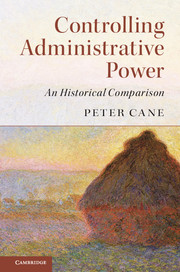Book contents
- Frontmatter
- Dedication
- Contents
- Preface
- Table of cases
- Table of legislation
- 1 Introduction: concepts and methodology
- 2 The English system of government
- 3 The US system of government
- 4 The Australian system of government
- 5 The development and institutional structure of control regimes
- 6 Administrative interpretation
- 7 Administrative fact-finding and policy-making
- 8 Administrative rule-making
- 9 Administrative adjudication
- 10 Private law controls
- 11 Controlling information
- 12 The New PublicManagement
- 13 Controlling the controllers
- 14 Concluding reflections on methodology and themes
- Bibliography
- Index
3 - The US system of government
Published online by Cambridge University Press: 05 March 2016
- Frontmatter
- Dedication
- Contents
- Preface
- Table of cases
- Table of legislation
- 1 Introduction: concepts and methodology
- 2 The English system of government
- 3 The US system of government
- 4 The Australian system of government
- 5 The development and institutional structure of control regimes
- 6 Administrative interpretation
- 7 Administrative fact-finding and policy-making
- 8 Administrative rule-making
- 9 Administrative adjudication
- 10 Private law controls
- 11 Controlling information
- 12 The New PublicManagement
- 13 Controlling the controllers
- 14 Concluding reflections on methodology and themes
- Bibliography
- Index
Summary
Colonial antecedents
In England, the first six decades of the eighteenth century were a period of relative political stability after the upheavals of the seventeenth. There was a rough balance of power between the monarchy and Parliament. By contrast, the politics of the American colonies at this time were characterised by instability and factional rivalry. Superficially, the systems of government in the colonies resembled that in England, consisting of an executive governor (who was, in the royal colonies, technically the Monarch's representative but in practice the representative of the British Government), a legislature consisting of a representative assembly and an upper chamber, and a system of local courts. Moreover, just as in Britain legislative sovereignty resided in the Monarch-in-Parliament, so (the argument ran) in the colonies it resided in the Monarch acting in concert with the various colonial legislatures. However, significant differences lay beneath the facial similarities. On the one hand, the formal powers of the governors in relation to the legislature and the judiciary were significantly greater than those of the English Monarch. On the other hand, because the electoral systems in the various colonies were relatively more democratic than the electoral system in England, and because governors were often significantly constrained by instructions from the British Government in London, the executive was politically weak.
The institutional beneficiaries of that weakness were the colonial legislatures. Just as the post-Revolutionary English Parliament claimed a monopoly of the power to impose taxation (and, more generally, to legislate) on the basis that it represented the people, so colonial legislatures now claimed a monopoly of power to impose taxation (and, more generally, to legislate – at least on matters of local concern) in their respective territories:
[T]hrough precedent and custom [they were] able to establish their authority and status as…the most important institutions in the colonial constitutions…[and] largely to neutralize the prerogative…The result was the continuing fragility of royal power in the colonies.
However, the power of these democratically elected assemblies was not universally applauded. During the period of Confederation after the Declaration of Independence in 1776, colonial legislatures committed various ‘excesses’ that generated ‘fear of the danger to minority interests, and particularly property, from popular rule’.
- Type
- Chapter
- Information
- Controlling Administrative PowerAn Historical Comparison, pp. 58 - 111Publisher: Cambridge University PressPrint publication year: 2016



